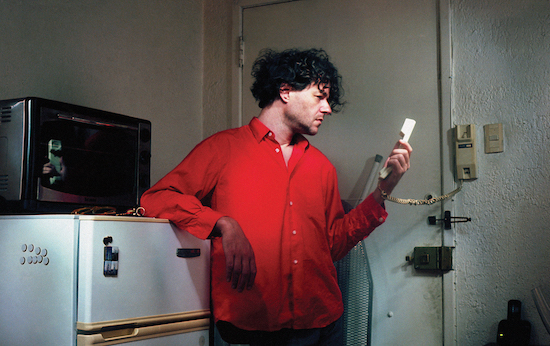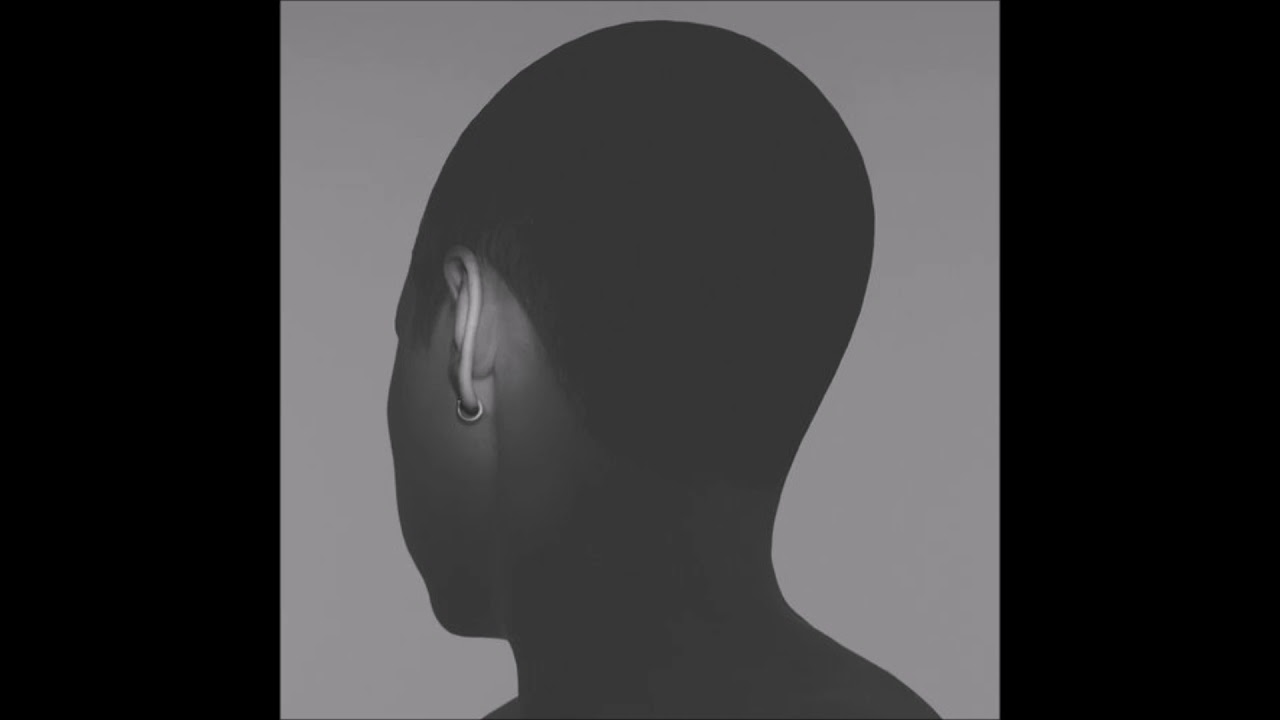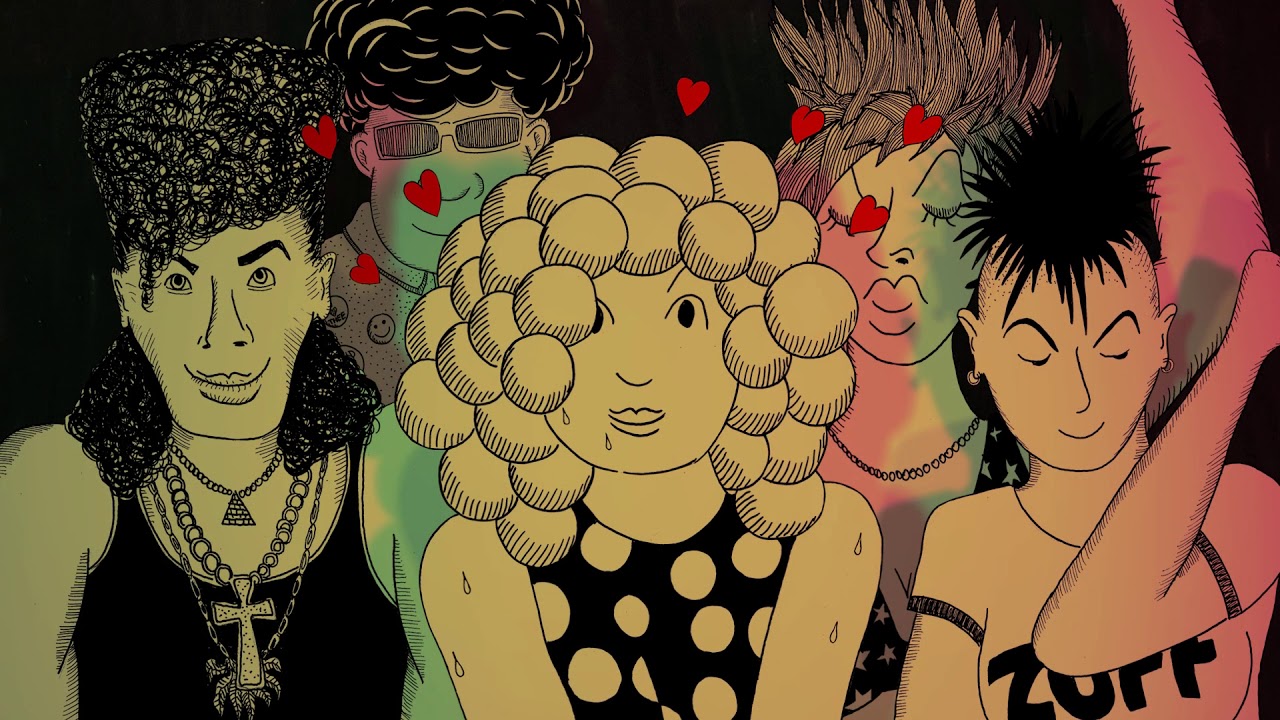Portraits by Alexis Mandujano
The Dance Music Outsider has become a familiar trope. He probably has a beard you could lose your spare change in, or wears a mask fashioned from something he found in his garage. He almost never does any publicity. He makes deranged music that sounds like it’s communing with a higher plane where the androids have broken loose and gone to a rave. Yes – regrettably – they are almost certainly always a “he”, as if some cosmic agreement has been written that women cannot be weird.
The best dance music oddballs, though, don’t even know they’re different – it’s everyone else that’s boring – which is certainly true in the case of Chilean rhythm master Matias Aguayo. An evening in his company may very well lead you to think that your avant-garde tastes are an alarming shade of vanilla. He has produced an album made up entirely of samples of his own voice. Another as the cross-dressing frontman of an imaginary new wave band. He sings and dances over his DJ sets – polyrhythmic Afro-Latin workouts in techno that join the dots between various points in the southern hemisphere and are one glittery jacket shy of cruise-ship cabaret. He has always flirted on the borders of underground club culture and the poppier end of alternative music but has never fully settled for either zone.
“I always felt that I’m on another planet to everybody else, like the reggae band invited to a country festival,” he says of how he’s never quite fitted in. But at the same time he doesn’t consider his taste in music unconventional. “I just think the others are too normal,” he continues. “I don’t feel that eccentric, I feel the rest [of music] has got so conformist that I look eccentric.” Each of his albums is radically different to the last, his guiding principle being that “it’s much more important to find new approaches in my work” than to appease fans or trends. “Yes, people don’t always” go with him, he says, but he’s “never had this fear of whether people will like it or not. I don’t want to be led by fear.” Besides, he enjoys being a beginner. “I feel like an eternal newcomer,” he says.
We are speaking in Medellín, Colombia’s vast city-valley hemmed in by jungle, and a place with which Aguayo has a particular affinity. It’s here that he teamed up with local musicians Gladkazuka and Sano to make the Rio Negro album in 2015, a “vision of dirty, raw and salsa-inspired contemporary Latin dance music”, and it’s the same outlook shared by Cómeme, the “radical” and “internationalist” label he started in 2009 with Avril Ceballos and which celebrates its tenth birthday this year. Their excellent slate of releases suggest a kind of subversive pan-Latin retrofuturism, confronting the Eurocentric dominance of the 4×4 house beat, and it has grown to encompass producers outside South America. Later that evening, we go to a basement reggaeton club Perro Negro (“black dog”), so named after the illegal parties that Aguayo and co used to play here years ago. You get the sense that their combined influence across all corners of the Latin-America underground has been subtle but vast.
Though they rarely speak about it, Cómeme also has a 50/50 gender split policy. It was a slow realisation of, “Why are there no women?” over the past five years, says Aguayo, and since then he and Ceballos have effectively A&R’d some of the most exciting names on the current club circuit, like Ana Helder, Charlotte Bendicks, Valesuchi and Borusiade. “We realised,” he said, that in order to give more women a platform, “we had to do something else – we had to change our strategy,” says Aguayo. “We decided to have a minimum of 50% female production on the releases and put it as a rule, just like ‘you need to master a record before you release it’. It became obligatory.”
Whatever their gender, though, Aguayo says that Cómeme is for the “renegades” who “live in their own worlds”. Binding them, perhaps, is making alternative music without being strange for strange’s sake. “Nowadays you can hear a lot of stuff that sounds superficially weird,” says Aguayo of how dance music has in some ways become a bit too cool. “It’s very easy to have good taste in music, you just need to follow certain rules and references and you can’t be wrong. So nobody is doing anything wrong! I think dance music also needs some cheesiness, or some humour.”
Humour and theatricality have always been present throughout Aguayo’s two-decade-long career and his way to counter any pretension. His parents were left-wing political exiles from Chile who settled in Cologne, and Aguayo, an amateur stage actor, grew up inspired by its punk and no-wave scene, as well as the US bands like Tuxedo Moon that he’d hear on late-night radio. In 2017, as a follow-up to his well-received, most accessible album yet, The Visitor, he did the opposite, creating a fictional no wave/post punk band called The Desdemonas with Gladkazuka in homage to his youth. The album, named after the imaginary place Sofarnopolis, came complete with a Love & Rockets-style comic book universe and pictures of Aguayo with slicked-back hair and red lipstick. He “enjoys very much” the feeling of rebirth, which he does “out of my own necessity to still feel joy in what I’m doing”.
After punk, Aguayo fell in with the Kompakt Records crew, who released his early music as Closer Musik with Dirk Leyers in the early 2000s. Then, in 2008, when the vest-ripping German techno scene was in full flight and its soundtrack was becoming increasingly clinical, Aguayo put out a slithery solo track called ‘Minimal’. It was a purring take-down of what electronic music had become, its refrain goading, "These clubbers don’t dance/ cuz that music got no groove”, atop a confrontational, attitudinal pulse. ‘Minimal’ became a minor underground hit and was remixed to acclaim by DJ Koze but it’s curious to compare the two producers now. Koze has acquired a demi-god cult status, even though he released a fairly bar-friendly disco-house album in last year’s Pick Up. Glance over the Resident Advisor listings and Aguayo is barely playing in Europe this summer.
Aguayo says that he “never felt a part” of that early European techno movement but also that he “didn’t want to belong” because dance music “was very blokey – and that’s still a problem.” Think of what you’d assume a techno DJ to have been like during that time – a strict all-black wardrobe, a stern expression that can only be the result of a hard night pushing buttons – and he is the exact opposite. He has a slippery sensuality, a penchant for loud clothing and a gentle, fluttering speaking voice. As a result of not fitting in, he says that he has “also suffered from toxic masculinity – not as much as a women, of course, but it is difficult if you’re surrounded by people who will judge your worth by what defines a ‘real man’.”
Whether it’s played by a woman or man, however, he says that “much of the music that is rewarded these days very blokey, and I really can’t relate to this musical normativity. For him, rhythm isn’t militant, it’s emotional, challenging the “Eurocentric perception” (he likes to use that phrase a lot) saying “that rhythm is something that carries the song and the emotion only lies in the melody”. He says that “there is definitely music that for me sounds very cisgender and heterosexual in the way it imposes itself on the body of others” and gives the example of “an authoritarian bass drum” that selectors inflict on nightclubs.

“The whole concept of the DJ is a little bit like that,” he says, “because you’re standing in a booth like a politician, and you have this mass of people in front of you, raising their arms, and you are dictating the beat. Many DJs will feel this entitlement, and there is very much a perception: ‘I am making these people dance’. It’s like a monologue.” His own approach is more intimate, picking out dancers in the crowd and reacting to them instead of treating the dancefloor as a mass. "I always liked the idea of, ‘I’m at the same party as you’ more”, he says.
He started singing over his DJ sets simply “because there was a microphone” at a party he was playing, but it has become a device to allow him to “get people to dance to weirder music.” Vocals are a definitive part of Aguayo’s work, though they’re not linear, inspired by the criss-crossing accents he’s heard on his travels, the chatter of birds or playground chants. His voice is used as a rhythmic tool, from the beatboxing tapestry of 2009’s Ay Ay Ay and its sublime pop single ‘Rollerskate’, to the futuristic, fun-poking chants of 2013’s The Visitor – featuring ‘Rrrrr’ which is built around the saucy sound of people rolling their rrrrrs – and that time he fronted Battles’ joyfully stuttering summer jam ‘Ice Cream’. (He is currently working on an album with Argentinian folk musician Juana Molina, another artist who shares his penchant for playful sing-speak).
So it comes as a shock that his latest album, Support Alien Invasion, is completely vocal-free. There is no slurring of nonsensical sexiness with a wiggle of the hips; this album, he says, “is an attempt to create a universal rhythmical language which would allow you to get in touch with other terrestrial or extraterrestrial cultures – no words necessary.” It’s darker than his usual style and spacier, insulated by a creeping sense of dread and a heavy, Dolby-Sound-doom.
While that sounds a bit sci-fi, the grounding reality is that Aguayo was interested in creating links between rhythms from different parts of the world that don’t get as much exposure as western ones (i.e. house and techno) in contemporary club music. He took, for example, the “Mexican trival triplet-based rhythms or “ancestral rhythms from the Venezuelan Amazon” and found that they “blended very well with some of the funk carioca rhythms from Rio but also with the rhythms from Durban.” These combinations created a “third” rhythm that didn’t yet exist, but one which he saw would appeal wherever he played (I can see them working well at a forward-thinking, post-colonial festival like Nyege Nyege in Uganda, for example).
That dark, grime-like style of gqom features heavily, the next microgenre in Aguayo’s history with South African electronic styles, having been one of the remixers for Warp’s release of DJ Mujava’s definitive SA house smash ‘Township Funk’ in 2008. He then worked with DJ Spoko – who he says is the uncredited architect of Mujava’s loopy rhythms – before he died last year, as well as gqom trio Rude Boyz and Jo’burg DJ/ actress Mujaji The Rain. Growing up, he says, “South Africa felt a little bit like a parallel struggle [to mine] in the sense that Chile had this dictatorship, South Africa had the apartheid” and when, in the 90s, a German DJ brought back some kwaito tracks from South Africa to Cologne, something clicked. “It inspired the genesis of Cómeme,” says Aguayo, because “we could feel that the rhythms we were doing [in Latin America] were similar to the South African rhythms.”
“We had always wanted this connection from south to south,” he says, in terms of countries along the southern hemisphere. “Usually it goes south to north.”
There is a timely element to Support Alien Invasion, too (one ominous track is even titled ‘2019’). Thematically, says Aguayo, the album is “about the lack of curiosity for the other, the stranger, the alien, the queer, the immigrant. Societies are becoming more exclusive and the borders more militarised and this is something that reflects in the mentality of the people.” Usually he labours over albums but this one came together more urgently because of the necessity of his “utopian” idea for “more inclusive music, leaving musical normativity behind.” An immigrant himself, one who has consistently country-hopped and never properly settled in one place, he says he doesn’t belong anywhere and that he identifies “not with a nation or specific culture but with other people who are marginal in the society in other ways.”
In terms of the club world, it can still feel like there’s a way to go before Aguayo and Cómeme’s idealistic, post-colonial vision for dance music is achieved. The next night I see him at a club called Calle 9+1, where the Chilean-born, Brazil-based Valesuchi is headlining. Earlier this year she called out leading Dutch electronic music festival Dekmantel for failing to book any Latin-American artists for their 2019 event, considering the festival had recently launched a major outpost in Brazil. Valesuchi stated in an Instagram post that the blatant lack of cultural exchange was hypocritical and Aguayo agrees that it’s “obviously frustrating” that “there’s a lack of sensitivity” when it comes to the underrepresentation of Latin-American artists on festival lineups.
If Matias Aguayo was ever flirting with the mainstream, though, these days he’s making moves to ignore it altogether. Last October he hosted a 12-hour Truman Show-style live stream in Santiago de Chile featuring nonstop collaborations with friends and local artists. Then he pressed delete on his social media presence. He remembers a time when “you did an album and then you had work for three years, and you didn’t have to talk about anything. Now, if you haven’t released or posted anything in a couple of months, it’s [the bookings have] gone a little bit quiet.” He says that it means that the music industry has “become very difficult for the hypersensitive artist. It doesn’t necessarily benefit the more artistic approach,” only the “culture of the selfie DJ and the entrepreneurial spirit.”
The gap between image and reality, he says, is “strange” and not always reflected in one’s musical output, where people can, he continues, “have very radical opinions” and be “very politically engaged on social media” but he doesn’t hear that disruptiveness “reflected in the music.” It’s why he finds it bizarre when I ask he’d ever consider writing something more commercial. He looks quizzically back across the table, as a mariachi band doorsteps diners in the background.
“I think we’re doing popular music,” he says. “For instance, a song like ‘Walter Neff’ or ‘123 No Gravity’ by Closer Musik – in an ideal world these should be number one hits.” Then again, Aguayo has created his own world, with a new musical dialect that feels light years ahead. After all, the true sign of a Dance Music Outsider is, like he says, that they operate in their own sphere, dancing to their own beat. “Maybe there’s a parallel world where all these songs are very popular and everyone can sing them,” he adds, pausing to consider it. “Or maybe I don’t have a very good perception of what could be popular. It would be cool to have a mainstream hit.”
Support Alien Invasion is out now on Crammed Discs and Cómeme, which celebrates its tenth anniversary this year










